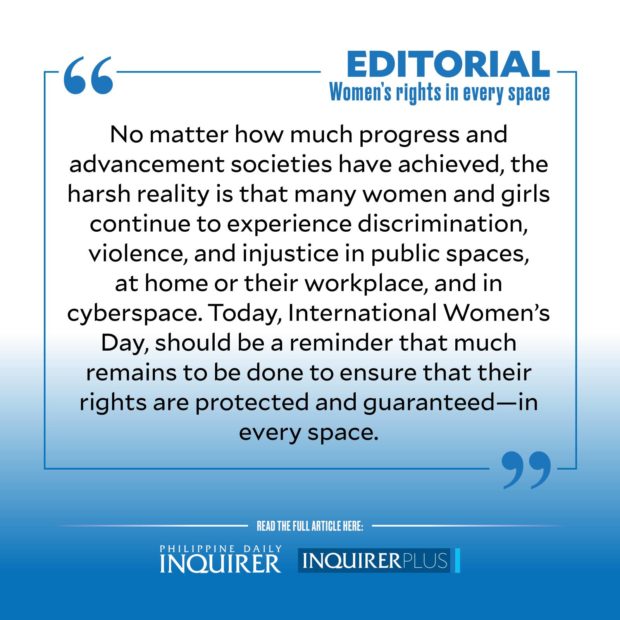Women’s rights in every space
 The fight for women’s independence and equality in the country has significantly advanced since President Corazon Aquino signed Proclamation No. 224 (s. 1988) declaring today as Women’s Rights Day.
The fight for women’s independence and equality in the country has significantly advanced since President Corazon Aquino signed Proclamation No. 224 (s. 1988) declaring today as Women’s Rights Day.
But the world has also changed a lot over the last 35 years, fueled by rapid technological progress. While technology has become a powerful tool for women and girls to exercise their rights, advance their career, and promote democracy, it has also heightened inequalities in the real and online worlds. While they face inequalities in access to technology, particularly in education and employment, the same technology has also exposed women and children to a toxic online environment that enables misogyny, stalking, harassment, and trafficking.
Women and girls are already vulnerable to many kinds of abuses offline, but the anonymity that cyberspace offers has made abusers more aggressive and the crimes more difficult to monitor. In an article last month, the Foundation for Media Alternatives (FMA) said it has observed a growing number of online gender-based violence (OGBV) cases since 2012, which it said were committed on a daily basis. The United Nations Entity for Gender Equality and the Empowerment of Women, also known as UN Women, defines OGBV as “harmful acts directed towards an individual or a group of individuals based on their gender that are partially or fully carried out through or enabled by technology.” These actions may come in various forms including sexist and rape jokes, threats through comments and other multimedia formats, exposed private information including photos and videos, and online sexual exploitation and abuse—and these represent an extension of the imbalance of power relations commonly seen offline.
Based on FMA data gathered from 2012 to 2022, there were 659 cases of OGBV in the Philippines, mostly sourced from media reports, emails and private messages, and personal sharing of survivors. All of these documented cases involved young women aged 18 years old and above, as well as minor girls. The victim-survivors reported that Facebook, Messenger, and encrypted messaging apps like Telegram and Viber were the most commonly used digital platforms for committing OGBV.
But what about those unreported abuses, many of which are read and shared every day on various social media platforms, contributing to the vitriol that happens in cyberspace? And, because such abuses happen on an online platform where there is speedy sharing of information, they have become normalized and considered a characteristic of the online public space. What is even more concerning, as pointed out by FMA, is that some state actors themselves have committed OGBV.
It cited the case of a former provincial governor who was charged for violating Republic Act No. 9262 or the Anti-Violence Against Women and their Children Act of 2004 and RA No. 10175 or the Cybercrime Prevention Act of 2012. The abuser’s former partner has complained that he threatened to spread sensitive private photos if she would not give in to his requests. Many victims have shared similar experiences in viral social media posts, but nothing concrete came out of many of them.
Not that the country lacks policies and laws promoting and protecting women’s and children’s rights whether online or offline—in fact there are enough of them and this has contributed to the country’s high ranking in the annual Global Gender Gap Index (No. 19 out of 146 countries last year and was the best-performing country in Asia in terms of gender parity that looks at the access of women and men to the same opportunities, rights, opportunities, etc.). Aside from RA No. 9262 and RA No. 10175, there is RA No. 11313 or The Safe Spaces Act (“Bawal Bastos” law), which covers all forms of gender-based sexual harassment committed in public spaces, educational or training institutions, workplaces, and online space. But preexisting discriminatory social norms that are influenced by gender, age, socioeconomic class, or even religion have stopped many victims from coming forward and pursuing cases legally.
There are victories though. Just recently, a male video blogger from Benguet province was charged with sexual harassment under RA 11313 for making grave threats and sexist comments against a woman in a politically charged post on Facebook. This has been considered a test case for RA No. 11313 in the Cordillera, and should be a warning that the long arm of the law can reach cyberspace. No matter how much progress and advancement societies have achieved, the harsh reality is that many women and girls continue to experience discrimination, violence, and injustice in public spaces, at home or their workplace, and in cyberspace. Today, International Women’s Day, should be a reminder that much remains to be done to ensure that their rights are protected and guaranteed—in every space.




















